Hard disk failures are imminent and it’s only a matter of time when the they start deteriorating and one bad day it’s dead forever. Oops, did you take a backup? While the failure rate can be reduced by choosing a good make and model, a traditional typical disk version do have a life span of 5 to 8 years. So, it’s a good idea to keep a track on its health status regularly so that you know when its death is nearing, and you can be prepared to swap the hard disk with replacement.
Typically, almost all hard disk manufacturers bundle a hard disk monitoring tool along with the hard disk. Unfortunately, the utility only runs in Microsoft Windows and Mac OS X operating systems. Moreover, popular third-party apps like Hard Disk Doctor, HDD Life too work on Windows platform and Mac OS X platforms. Linux users can use GSmartControl application. It is 100% free software and directly available from the Linux Mint’s Software Center as well as Ubuntu software center.
STEP 1: Click ‘Applications’ and launch ‘Software Manager’.
STEP 2: Look for ‘GSmartControl’ and install it.
STEP 3: Plug-in you external hard disk which you want to check. If you are checking the computer’s internal hard disk, then you can open the GSmartControl app directly.
STEP 4: Enter root password when prompted.
STEP 5: You should see all the hard disks connected to your computer including the internal hard disk drive.
STEP 6: Right-click on the hard disk icon which you want to check and select. In my case I want to check a 2TB WD Passport external hard disk drive.
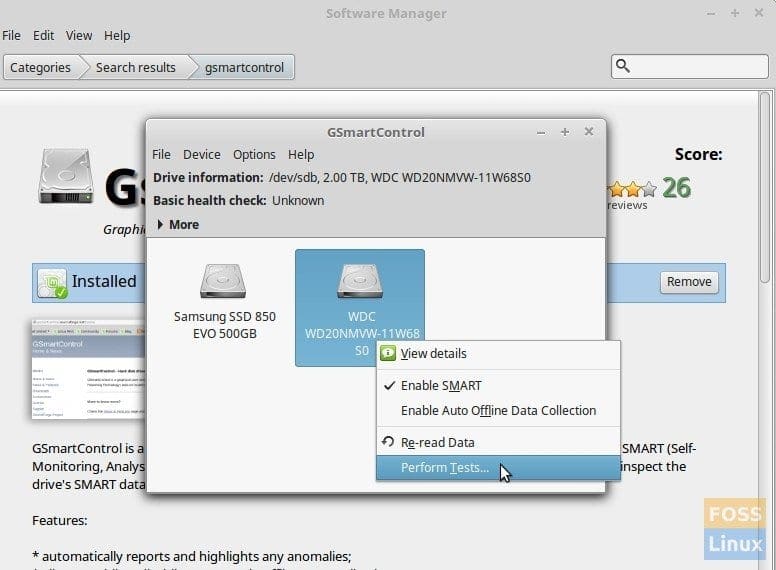
GSmartControl Perform Tests
STEP 7: In the ‘Perform Tests’ tab, you can choose ‘Test type’. You can start with ‘Short Self-test’ and then proceed with longer ones if you want. Short test is good enough to show out problems in a seriously failing hard disk.
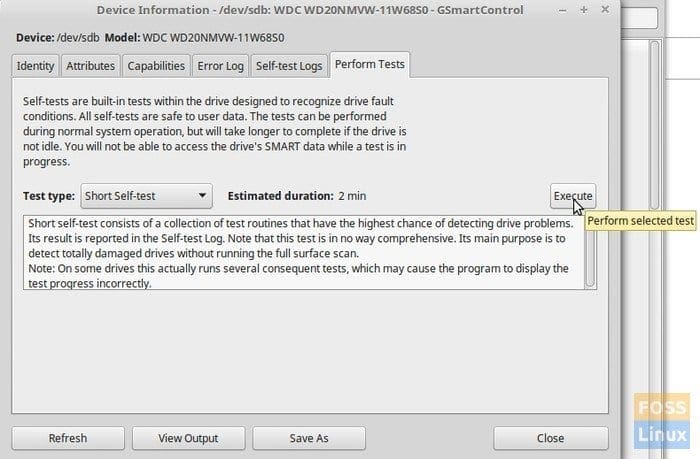
Check Hard Disk
STEP 8: Click ‘Execute’. After the process is done, it will show summary of ‘Test result’. In my case it showed ‘Completed without error’.
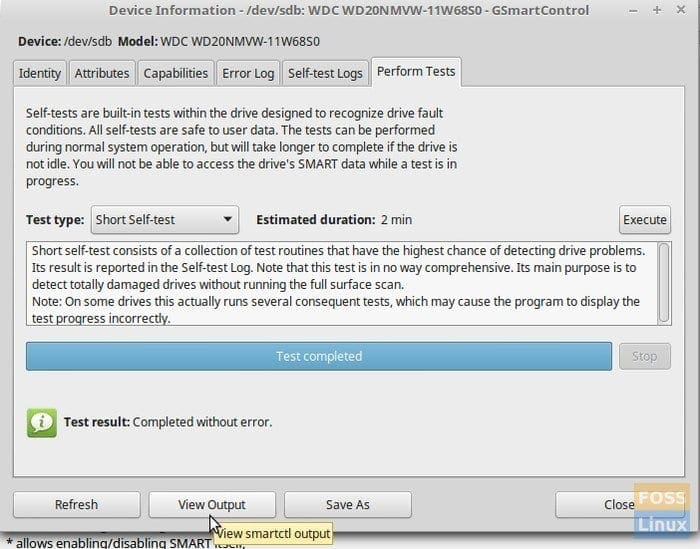
Hard disk check report summary
You can click on ‘View Output’ to see full report.
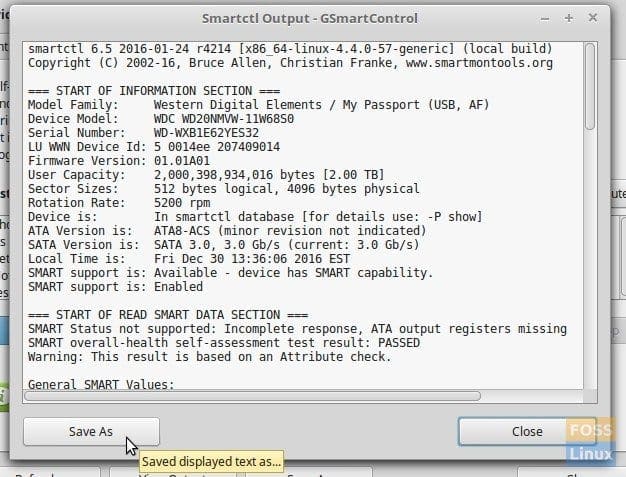
Full Check Report
Scroll down in the report to find S.M.A.R.T attributes. This is the data that says about your hard disk status. The ‘Raw_Read_Error_Rate’, ‘Reallocated_Sector_Count’, ‘Seek_Error_Rate’ are some important attributes to look for. Check the current value against the Threshold and the Worst value. If any of the attributes are coming close to the Worst values, it implies hard disk life is deteriorating.
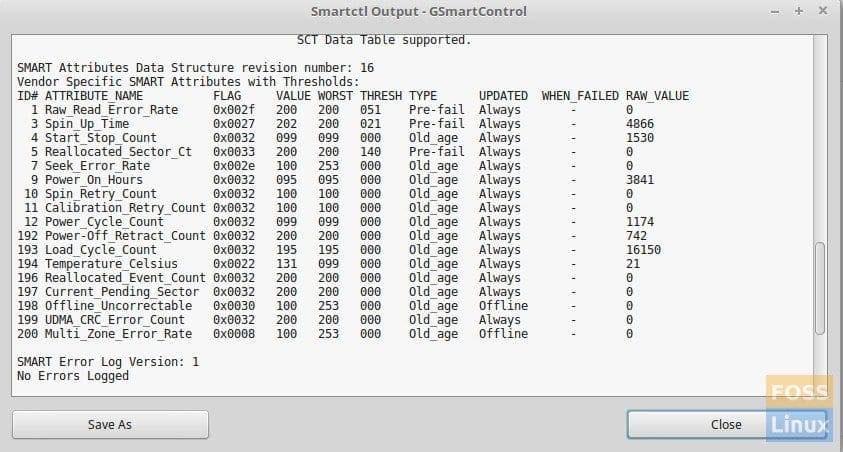
S.M.A.R.T Attributes


4 comments
thanks for this and on http://www.fosslinux.com/939/how-to-check-and-monitor-hard-disk-life-in-linux-mint-and-ubuntu.htm
and on my disk- seen on intern; “disks” – (gnome-disk-utility 3.10.0) it says disk will probably fail soon,(23deg.C)- but it runs still and have done long,
SO how likely it is that the disk will actually crash? – and how is “IT” measured?
This is not safe. Linux mint automatically check your disk for errors during boot time.
Vendor Specific SMART Attributes with Thresholds:
ID# ATTRIBUTE_NAME FLAGS VALUE WORST THRESH FAIL RAW_VALUE
1 Raw_Read_Error_Rate POSR-K 100 100 051 – 2159
2 Throughput_Performance POS–K 055 055 000 – 6130
3 Spin_Up_Time PO—K 091 090 025 – 2855
4 Start_Stop_Count -O–CK 088 088 000 – 12950
5 Reallocated_Sector_Ct PO–CK 252 252 010 – 0
7 Seek_Error_Rate POSR-K 252 252 051 – 0
8 Seek_Time_Performance P-S–K 252 252 015 – 0
9 Power_On_Hours -O–CK 100 100 000 – 16890
10 Spin_Retry_Count PO–CK 252 252 051 – 0
11 Calibration_Retry_Count -O–CK 097 097 000 – 3864
12 Power_Cycle_Count -O–CK 090 090 000 – 10470
181 Program_Fail_Cnt_Total -O—K 100 100 000 – 17920057
183 Runtime_Bad_Block -O–CK 252 252 010 – 0
184 End-to-End_Error PO–CK 252 252 048 – 0
186 Unknown_Attribute -O–CK 252 252 000 – 0
187 Reported_Uncorrect -O–CK 100 100 000 – 66
188 Command_Timeout -O–CK 252 252 000 – 0
190 Airflow_Temperature_Cel -O—- 064 048 040 – 36 (Min/Max 3/52)
191 G-Sense_Error_Rate -O—K 100 100 000 – 879
192 Power-Off_Retract_Count -O—K 252 252 000 – 0
193 Load_Cycle_Count -O–CK 078 078 000 – 228585
194 Temperature_Celsius -O—- 064 048 000 – 36 (Min/Max 3/52)
195 Hardware_ECC_Recovered -O-RCK 100 100 000 – 0
196 Reallocated_Event_Count -O–CK 252 252 000 – 0
197 Current_Pending_Sector -O–CK 252 100 000 – 0
198 Offline_Uncorrectable —-CK 252 252 000 – 0
199 UDMA_CRC_Error_Count -OS-CK 200 200 000 – 0
200 Multi_Zone_Error_Rate -O-R-K 001 001 000 – 32805
+++++++++++++++++++++++++++++++++++++
I assume that this does not look right
when I right click it wont let me perform a test. I am Using a Sandisk Portable Extreme SSD